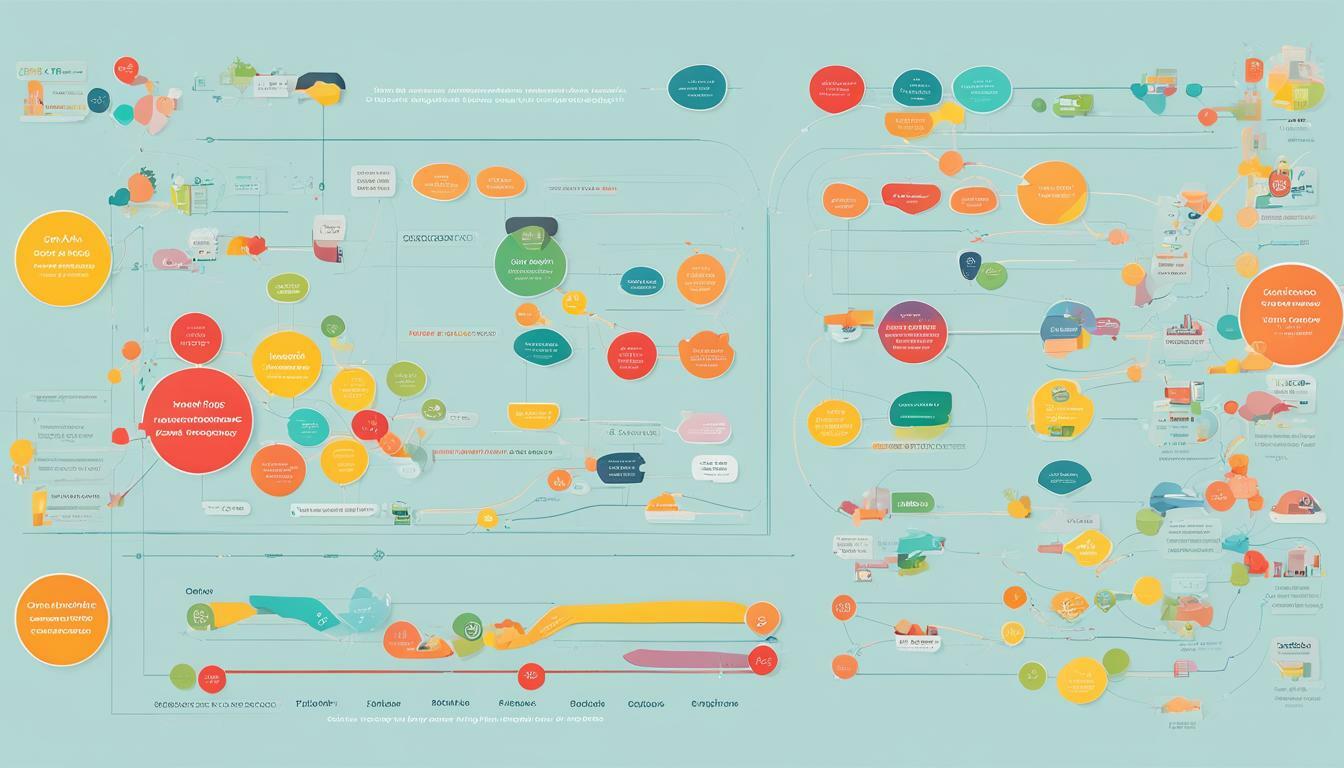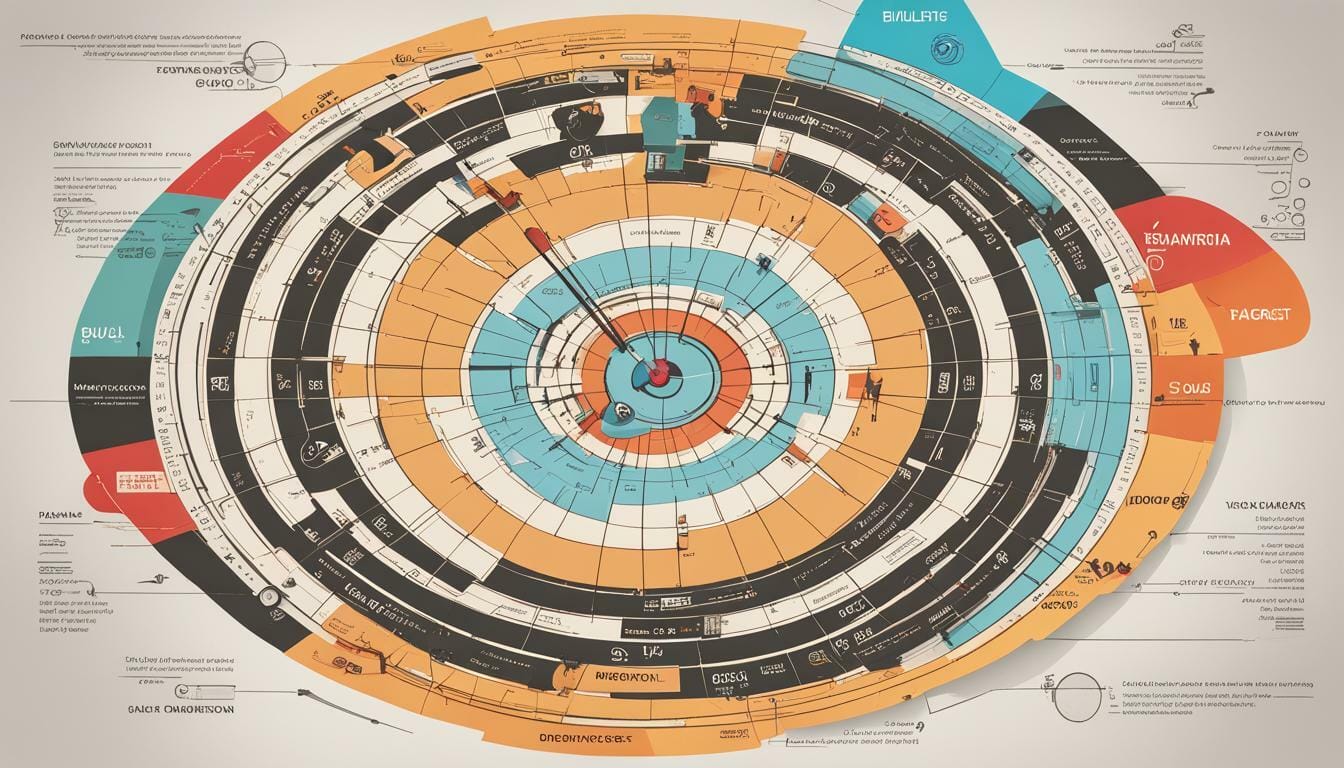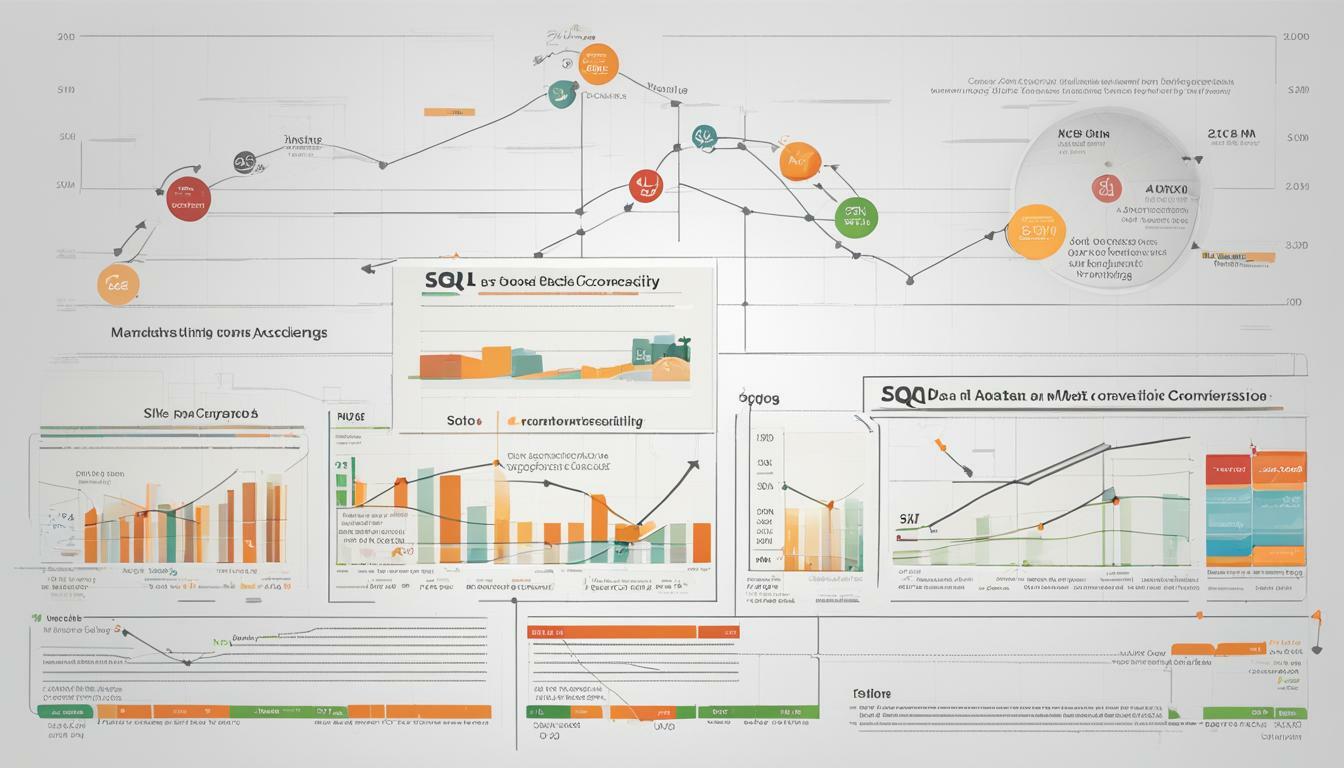Unlock Potential: Harnessing SQL in Marketing Strategies

In today’s marketing environment, the importance of database marketing has escalated, strengthened by key data. It’s an essential tool for businesses in understanding customer habits and making strategic decisions based on that information. Hence, contemporary marketers have put a great emphasis on the proficiency in SQL (Structured Query Language).
SQL is a programming language used to manage and analyze relational databases. It allows marketers to extract, manipulate, and analyze large sets of data, providing valuable insights into customer behaviors, preferences, and trends. With the power of SQL, marketers can unlock the potential of their marketing strategies and drive ROI.
Key Takeaways:
- SQL is a valuable skill for marketers in today’s data-driven marketing landscape.
- SQL allows marketers to extract, manipulate, and analyze large sets of data, providing valuable insights into customer behaviors, preferences, and trends.
- With the power of SQL, marketers can unlock the potential of their marketing strategies and drive ROI.
Understanding SQL for Marketers
As a marketer, you may have heard the term SQL being thrown around, but what exactly is SQL, and how can it be used in marketing strategies? SQL, or Structured Query Language, is a programming language used to manage and manipulate relational databases. In simpler terms, SQL is used to query and analyze large sets of data.
In marketing, SQL analytics can be used to extract meaningful insights from customer data. This is done through the use of SQL queries, which allow marketers to analyze and segment customer data based on various criteria such as demographics, purchase history, and website behavior.
Using SQL queries in marketing can provide valuable insights into customer behavior and preferences, allowing marketers to create more targeted and personalized campaigns. By understanding the data behind customer interactions, marketers can make data-driven decisions that lead to higher ROI and better campaign performance.

Leveraging SQL for Customer Data Analysis
As a marketer, analyzing customer data is crucial to understanding their behaviors and preferences. SQL provides a powerful tool for customer data analysis, enabling marketers to gain valuable insights that can inform their marketing strategies.
SQL analytics allows marketers to dig deeper into customer data, creating a comprehensive understanding of their target audience. With SQL queries, marketers can filter and sort data to highlight trends and patterns, identifying opportunities to optimize campaigns and improve ROI.
| Benefits of SQL Analytics for Customer Data Analysis: | |
|---|---|
| 1. Efficiently process large amounts of data | |
| 2. Identify patterns and trends using custom queries | |
| 3. Gain deeper insights into customer behavior | |
| 4. Make data-driven decisions to optimize campaigns |
SQL analytics can uncover insights that would be difficult or impossible to identify manually. By leveraging this tool, marketers can take a more proactive approach to data analysis, identifying trends and optimizing campaigns in real time.
SQL analytics also allows for more accurate targeting and segmentation based on customer data. This enables marketers to create more personalized campaigns, improving the effectiveness and ROI of their marketing efforts.
 Incorporating SQL analytics into marketing strategies can help marketers gain valuable insights into their target audience and create more effective campaigns.
Incorporating SQL analytics into marketing strategies can help marketers gain valuable insights into their target audience and create more effective campaigns.Targeting and Segmentation with SQL
In today’s fast-paced marketing landscape, it’s crucial to target specific customer segments with personalized campaigns that resonate with their interests and needs. SQL is a powerful tool that can help marketers achieve this goal by leveraging data-driven insights to develop targeted campaigns that deliver results.
SQL for targeting involves using advanced queries to extract customer data and segment it based on various criteria, such as demographics, past purchases, and website behavior. Marketers can then create targeted campaigns that speak directly to each customer segment, addressing their unique interests and needs.
SQL for Segmentation
One of the most significant benefits of SQL for targeting is its ability to segment customers effectively. By using advanced queries to segment customer data, marketers can identify specific groups that share similar characteristics, such as age, gender, location, or past purchase behavior. This allows marketers to develop targeted campaigns that are relevant to each group’s unique interests and needs, increasing the likelihood of conversions and engagement.
For instance, a clothing retailer can use SQL to segment its customer data based on past purchase behavior. By analyzing customer purchase history, the retailer can identify customers who have bought a specific product or category in the past. They can then use this information to develop targeted campaigns that advertise complementary products, such as accessories or shoes, to these customers.
SQL for Personalization
Personalization is a key component of modern marketing campaigns, and SQL can be instrumental in achieving this goal. By using SQL to extract customer data and segment customers based on various criteria, marketers can develop highly personalized campaigns that resonate with each customer. Personalized campaigns can increase customer engagement and loyalty, resulting in higher conversions and ROI.
For example, a tourism company can use SQL to segment its customer data based on past search behavior and location. They can then use this information to personalize campaigns that offer deals and promotions for specific destinations that the customer has shown interest in, increasing the likelihood of conversion.
Overall, SQL is a versatile and powerful tool that can help marketers effectively target specific customer segments with personalized campaigns. With SQL for targeting, marketers can extract valuable insights from customer data and use these insights to develop campaigns that resonate with customers and increase conversions and ROI.

Optimizing Campaigns with SQL
As marketers, we all know the importance of running effective campaigns. However, it can be challenging to know how to optimize them for the best possible results. That’s where SQL comes in.
SQL can help us measure campaign effectiveness, identify areas for improvement, and make data-driven decisions. By analyzing the data collected from our campaigns, we can gain valuable insights into what worked and what didn’t.
One way that SQL can optimize our campaigns is through A/B testing. By comparing the performance of different variations of our campaigns, we can determine which one is the most effective. SQL can also help us identify which audience segments respond best to our campaigns.
Another way that SQL can optimize our campaigns is through attribution modeling. By analyzing the touchpoints that lead to conversions, we can allocate our marketing budget more effectively and ensure that our campaigns are reaching the right people at the right time.
Overall, SQL can be a powerful tool for optimizing our marketing campaigns. By leveraging the insights gained from SQL analytics, we can make data-driven decisions that help us achieve better results and maximize our ROI.

Leveraging SQL for Customer Data Analysis
As a marketer, understanding your customers’ preferences and behaviors is critical to the success of your campaigns. This is where SQL comes in handy. By leveraging SQL analytics, you can analyze large volumes of customer data and gain valuable insights.
SQL is particularly useful in identifying patterns and trends in customer behavior. By writing queries that analyze customer data, you can track purchasing behavior, preferences, and demographic information.
For example, you might use SQL queries to analyze customer data and determine what products are frequently purchased together. This can help you develop personalized product recommendations and create more effective cross-selling campaigns.
Another useful application of SQL in customer data analysis is in predicting customer churn. By analyzing past behavior and identifying patterns, SQL queries can help you predict which customers are most likely to churn and take proactive steps to prevent it.
Overall, SQL is a powerful tool for customer data analysis, providing marketers with the insights they need to make data-driven decisions and create effective campaigns that resonate with their target audience.

Integrating SQL into Marketing Workflows
Integrating SQL into marketing workflows can seem daunting at first, but it is a crucial step for unlocking the power of data-driven marketing. By utilizing SQL in marketing, marketers can elevate their campaigns and ensure they are maximizing ROI.
One of the most important aspects of integrating SQL into marketing workflows is the implementation of database marketing. This involves collecting customer data and organizing it in a way that allows for easy access and analysis. SQL queries can then be used to extract valuable information from this database, such as customer demographics and behavior patterns.
When incorporating SQL into marketing workflows, it is important to have a clear understanding of the specific goals and objectives of each campaign. This will help in determining which SQL functions and operations to use, as well as how to structure and analyze data.
It is also essential to ensure proper training and resources are available to marketers when utilizing SQL in their daily activities. This may involve providing access to SQL analytics tools and training programs to ensure they are effectively utilizing the technology.
By effectively integrating SQL into marketing workflows and embracing database marketing, marketers can unlock the full potential of their campaigns and drive increased ROI.

Overcoming Challenges and Limitations of SQL in Marketing
While SQL can greatly benefit marketing strategies, it’s not without its challenges and limitations. As a marketer, it’s important to be aware of these potential roadblocks to ensure successful utilization of SQL in your marketing efforts.
One common challenge is the complexity of SQL queries. Writing effective queries requires a certain level of technical expertise, and mistakes can result in inaccurate data analysis. To overcome this, marketers can consider partnering with a data analyst or investing in SQL training for their team.
Another challenge is data quality. If your database is riddled with inaccuracies or incomplete information, your SQL analysis will suffer. It’s important to regularly clean and maintain your data to ensure the accuracy of your SQL queries.
Limitations of SQL include the inability to handle unstructured data, such as social media posts or images. To address this, marketers may need to incorporate other tools or technologies, such as natural language processing or image recognition software.
Additionally, SQL can be limited in its ability to predict future behaviors or outcomes. While it can provide valuable insights into past and present behavior, it’s important for marketers to supplement their SQL analysis with other predictive modeling techniques.
Despite these challenges and limitations, SQL remains a powerful tool for marketers. By staying aware of its potential drawbacks and taking proactive steps to address them, marketers can unlock the full potential of SQL in their marketing strategies.
Best Practices for Utilizing SQL in Marketing
As a marketer, utilizing SQL in marketing strategies can be daunting. However, with proper data organization and effective SQL query optimization, it can unlock the full potential of your marketing campaigns. Here are some best practices to keep in mind:
- Plan ahead: Before utilizing SQL in your campaigns, make sure to clearly define your objectives and goals. Plan the queries you will use to obtain the necessary data that will help you make more informed decisions.
- Stay organized: Keep your data organized in a way that enables you to run efficient SQL queries. This involves structuring data in logical tables and breaking down data into smaller, more manageable components.
- Optimize queries: Avoid running queries that retrieve unnecessary data. Optimize your queries by only selecting the necessary data points and using WHERE clauses to filter out irrelevant data.
- Use SQL functions: SQL has a variety of unique functions that can assist in data analysis, such as COUNT, SUM, and AVG. Make use of these functions to get the most out of your data.
- Stay current: SQL is constantly evolving, so it’s important to stay up to date with the latest developments and advancements in the field. Keep an eye out for new technologies and trends that may impact the use of SQL in marketing.
By following these best practices, you can effectively harness the power of SQL in your marketing strategies, making data-driven decisions and optimizing ROI.

Case Studies: Real-Life Examples of SQL in Marketing
SQL has revolutionized the way marketers approach data analysis and campaign optimization. By leveraging the power of SQL analytics and database marketing, companies can achieve significant ROI and enhance customer engagement. The following case studies showcase real-life examples of how SQL can be used effectively in marketing strategies.
Case Study 1: Starbucks
Starbucks, the world-renowned coffee chain, leveraged customer data to enhance customer experience. The company used SQL analytics to gain insights into their customers’ preferences and behaviors. By analyzing customer data, Starbucks was able to create personalized campaigns that resonated with their audience. Based on the insights gained through SQL queries, Starbucks introduced its highly popular “My Starbucks Rewards” program. The program resulted in a 26% increase in customer visits and a 28% increase in spending by members.
Case Study 2: Netflix
Netflix, the streaming giant, uses SQL to segment its audience and create personalized recommendations. By analyzing customer data, Netflix can identify what its subscribers are watching and what they may enjoy watching in the future. By using SQL queries, Netflix was able to identify the top 20 genres that appeal to their audience. Based on this data, the company creates personalized recommendations and tailors content to its viewers. The result was a 35% reduction in customer churn and an increase in customer satisfaction.

Case Study 3: HubSpot
HubSpot, the inbound marketing and sales software company, uses SQL to optimize its campaigns and measure its ROI. By analyzing customer data, HubSpot can identify which campaigns are successful and which ones need improvement. By using SQL queries, the company was able to identify that their most effective campaigns were those that targeted specific customer segments with personalized messaging. Based on this data, HubSpot redesigned its marketing campaigns, resulting in a 45% increase in lead generation and a 25% increase in sales.
These case studies demonstrate the power of SQL in marketing strategies. By utilizing SQL analytics and database marketing, companies can gain valuable insights and create personalized campaigns that resonate with their audience. The result is increased ROI and enhanced customer engagement.
How Can Python Projects Help Improve Cyber Security?
Python projects can be a valuable tool to master cyber security with python. By leveraging its extensive libraries and frameworks, developers can build powerful tools for network analysis, vulnerability scanning, and encryption. With Python’s simplicity and versatility, professionals can enhance their abilities to protect against cyber threats and reinforce security practices effectively.
Future Trends and Advancements in SQL for Marketing
As technology continues to advance, the role of SQL in marketing strategies will continue to evolve. Data analysis and insights will remain essential for effective marketing campaigns, with SQL serving as a powerful tool for unlocking customer behavior patterns and preferences.
The future of SQL in marketing will likely involve the development of more sophisticated analytics tools, allowing for more accurate and predictive modeling. Companies will be able to leverage SQL to better tailor their products and services to customer needs.
Another trend for the future is the integration of machine learning and artificial intelligence into SQL analytics. This will enable marketers to create even more personalized campaigns and communications, increasing the effectiveness of their marketing strategies.
As data privacy concerns continue to grow, it will be more important than ever to ensure that SQL databases are secure and compliant with relevant regulations. This may lead to the development of more stringent data security practices and protocols specifically for SQL databases.
Overall, the future of SQL in marketing is bright, with continuous advancements and new technologies providing even more opportunities for marketers to unlock the full potential of their data.

“The future of SQL in marketing is bright, with continuous advancements and new technologies providing even more opportunities for marketers to unlock the full potential of their data.”
Conclusion
As a copywriting journalist, I have seen firsthand the potential of using SQL in marketing strategies. SQL is a powerful tool for marketers, providing the ability to analyze customer data, create targeted campaigns, and optimize ROI.
By understanding SQL analytics and utilizing SQL queries, marketers can gain valuable insights into customer behaviors, preferences, and trends. They can use this information to create personalized campaigns and communications, improving the customer experience and increasing engagement.
Integrating SQL into marketing workflows can be challenging, but with the right approach, marketers can overcome these obstacles and maximize the potential of SQL. Best practices such as data organization, SQL query optimization, and leveraging SQL functions effectively can help marketers achieve better results.
The success of SQL in marketing is demonstrated through real-life case studies. Database marketing and SQL analytics have proven to be effective in improving campaign effectiveness and ROI.
The future of SQL in marketing looks bright, with emerging technologies offering new possibilities for data analysis and insights. As a copywriting journalist, I am excited to see the continued advancements in SQL and how they can be utilized to unlock even more potential in marketing strategies.
Overall, the power of SQL in marketing cannot be ignored. Its ability to provide valuable insights, create targeted campaigns, and optimize ROI can make a significant impact on any marketing strategy. As a marketer, it is essential to understand and utilize SQL in order to stay ahead in today’s competitive market.
FAQ
Q: What is SQL?
A: SQL stands for Structured Query Language. It is a programming language designed for managing and manipulating databases.
Q: How can SQL be used in marketing?
A: SQL can be used in marketing to analyze customer data, target specific customer segments, optimize campaigns, uncover valuable insights, and integrate into marketing workflows for improved efficiency.
Q: What are the benefits of using SQL in marketing?
A: Using SQL in marketing allows for data-driven decision making, personalized campaigns, improved campaign effectiveness, better understanding of customer behaviors and preferences, and optimization of marketing strategies for better ROI.
Q: What are some best practices for utilizing SQL in marketing?
A: Some best practices for utilizing SQL in marketing include proper data organization, query optimization, leveraging SQL functions effectively, and staying updated on industry trends and advancements.
Q: Are there any limitations or challenges to using SQL in marketing?
A: Some challenges of using SQL in marketing include managing large datasets, complex queries, and ensuring data security. However, with proper knowledge and implementation, these challenges can be overcome to unlock the full potential of SQL.
Q: Can you provide examples of real-life case studies showcasing the use of SQL in marketing?
A: Yes, there are numerous real-life case studies that highlight the successful use of SQL in marketing. These case studies showcase the impact of SQL analytics and database marketing on campaign effectiveness and ROI.




